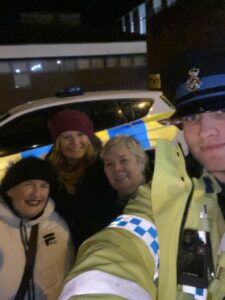We welcomed DS Jen Jeffcoat-Marsh to talk to us about how Wiltshire Police are dealing with VAWG and Rape And Serious Sexual Assault (RASSO).
She began by explaining about Op Soteria, the first National Operating Model (NOM) for the investigation of rape and serious sexual offences. It began in Avon and Somerset Police with the aim of bringing more rape and sexual assault cases to trial. It was rolled out across England and Wales in July 2023 after successes in pilot areas.
A year later the Chief Constable in charge said: “As the report says, the system wide benefits this programme offers are ‘a major opportunity for the criminal justice system to finally give victims the service they deserve’ and only by working together and making this a national model, not only for RASSO but even for other types of crime, can we achieve this.”
There remains a shortage of RASSO trained detectives, but all new recruits have to undergo RASSO training.

Changes in approach
One of the changes implemented by the NOM is that separate detectives are assigned to deal with the victim and another to search for and deal with the suspect.
Officers are trained to know what to do to take advantage of the ‘Golden Hour’ immediately after the offence has taken place and how to treat the victim and witnesses (who are also victims).
Another strand to the training is to recognise non-contact offending and consider that this can and does escalate into contact offending.
Project Vigilant
Launched by Thames Valley Police in Oxford in 2020, it has now been adopted by Wiltshire Police. However funding is not always available for operations. The aim is to spot predators before an incident takes place and intervening to prevent escalation. Specially trained officers are deployed in areas of the nighttime economy during the critical hours. They look for behaviour such as cars circling an area with men inside but with spare seats, sober men watching women drinking, groups of young men loitering near cafes or takeaways or sober men approaching drunk women. Officers can then intervene by taking names and addresses (they can arrest someone refusing to comply) and then follow up with a home visit in the next days. By making it clear such behaviour is not going to be tolerated, the aim is to dissuade these men from persisting, or at least to move elsewhere.
During the day, community police officers also look out for anti-social behaviour and step in to intervene. The aim is also to work with the community to build trust and confidence by offering safety advice and stop offences from happening.
Bus and taxi drivers are offered training and others are encouraged to undertake bystander training.
The implementation of higher standards of forensic investigations means that victims of RASSO in Wiltshire still need to be processed at Swindon Sexual Assault Referral Centre (SARC), which is not ideal for those assaulted in the south of the county.
National Database
All Police Forces have their own computer systems but they can also search the National Police Computer database for information about suspects. Anyone who has had dealings with the police will have their details recorded. Detectives can therefore check to see if they have offended in other areas.
What next?
After this informative talk we broke up into discussion groups. We first pooled our main takeaways and then discussed what could be done as a group and as individuals.
Many members thought we should undertake, promote and organise bystander training.
Other topics were:
- what training do bar staff receive?
- what support is there for women and wives of military?
- can we use FOI requests to find out about police vetting
This evening should be the start of further planning to develop our safety project.

